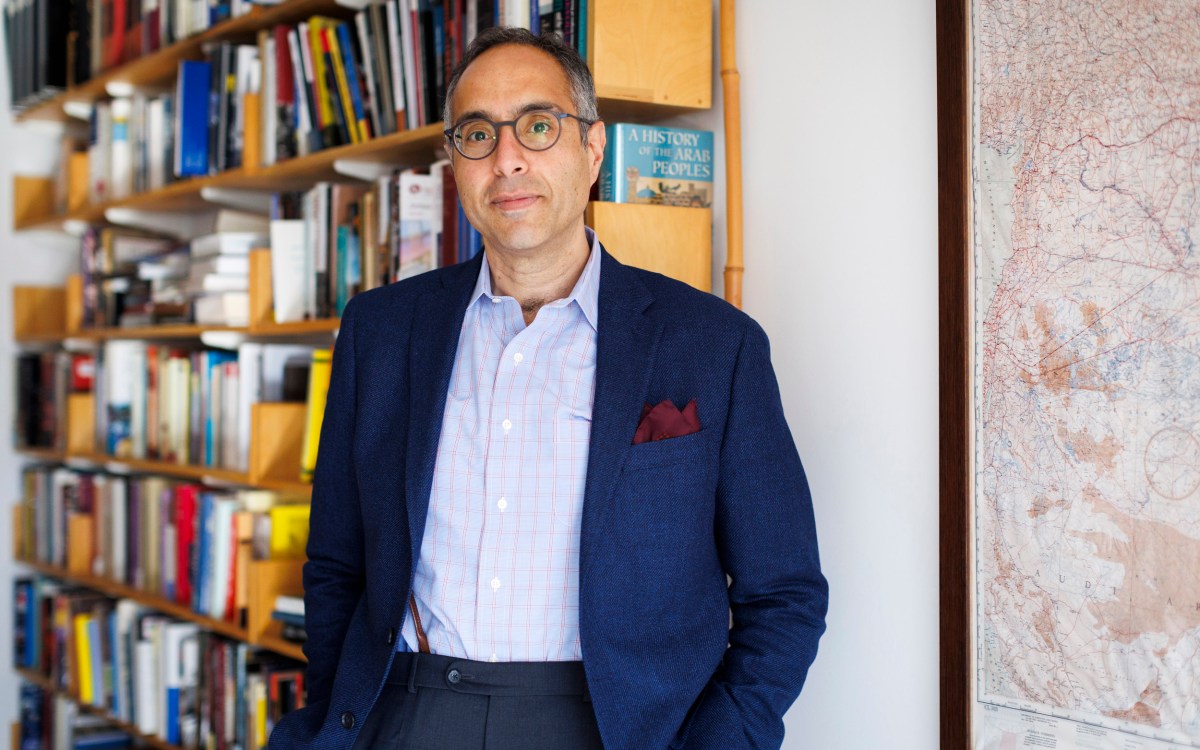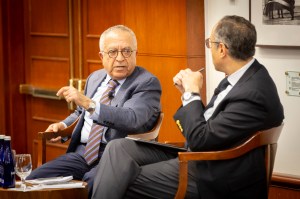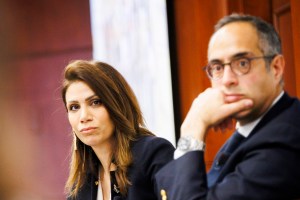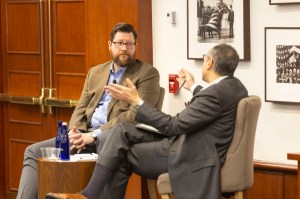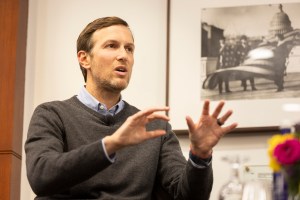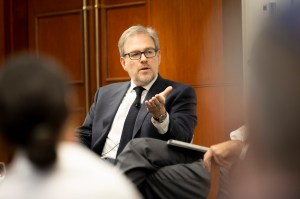Gaza cease-fire alone won’t repair larger enduring rift, political scientist says
Einat Wilf, who is also former Knesset member, says shift needed in Palestinian ideology on legitimacy of Israel

Einat Wilf speaks with Tarek Masoud.
Stephanie Mitchell/Harvard Staff Photographer
Calls for a cease-fire in Gaza may be well-intentioned, but a halt to the current fighting will not repair the enduring rift between Israelis and Palestinians. That can only happen once the Palestinians abandon an ideology that rejects the legitimacy of a sovereign Jewish state, said Israeli political scientist Einat Wilf ’96.
During a conversation Friday with Tarek Masoud, Ford Foundation Professor of Democracy and Governance and faculty director of the Middle East Initiative at HKS, Wilf spoke about the war in Gaza and why she thinks there’s been so little progress reaching a resolution over the years. The talk was the fifth in an ongoing Middle East Dialogues series at Harvard Kennedy School, organized by Masoud, which aims to showcase a range of viewpoints on the current crisis and promote informed dialogue.
Describing herself as “the poster child of the Israeli Two-Stater Left,” Wilf served in the Knesset, Israel’s parliament, from 2010 to 2013 as a member of the Labor Party, which supports the creation of an independent Palestinian state. She said she still favors such a goal, but no longer believes the conflict between Palestinians and Israelis is just about land.
“I voted for [Yitzhak] Rabin; I voted for [Ehud] Barak,” she said of the former Labor prime ministers. “I was euphoric in the ’90s, like many Israelis … when Barak goes to Camp David,” she said. “I believed in the vision of a new Middle East.”
“Sometimes you have to do things that don’t feel good but will actually begin to do good. So, if we want to get out of this conflict … we need to go to the core ideology that sustains it and begin to transform it.”
Einat Wilf, Israeli political scientist
But in 2000 and again in 2008, she watched Palestinian leaders refuse the terms of proposals from the Israelis for a state in the West Bank in Gaza.
“And I began to ask myself, ‘What is going on? What do the Palestinians want — because it’s clearly not a state,’” said Wilf, a former intelligence analyst. “They could have had that, and they walked away” without being criticized by the Palestinian people.
She came to that realization after conversations she’s had with many highly educated, moderate Palestinians over the last 20 years. “They basically tell me things like, ‘The Jewish people are not a people. You’re only a religion. This idea that you have a connection to this land, you invented it to steal our own,’” she said.
“And I realized from the conversations with them that how they think about the conflict, and how I think about it, don’t even meet. For them, the very existence of a sovereign Jewish state is illegitimate.”
Masoud said some might agree that walking away from the Camp David summit in 2000 and the Ehud Olmert peace deal in 2008 was “a huge error.” But he suggested the Palestinian leadership may have felt there wasn’t enough specificity in the Israeli proposals and turned them down on that basis, not because they couldn’t accept the legitimacy of a Jewish state.
If that were true, Wilf argued, Palestinians in the leadership and intellectual classes would have criticized those decisions and urged a return to the bargaining table. “There [were] no such voices, and there are still no such voices,” she said.
All of the factors cited by today’s critics of Israel — its occupation of the West Bank, the settlements, the blockades, or the existence of Palestinian refugees — are not to blame for the current failure to achieve peace. None of these existed in 1947 when the United Nations adopted the partition plan for Palestine, Wilf said. At its crux, this is a conflict about the Jews who want a state and the Palestinians who don’t want them to have one, she said.
Palestinian leaders have expressed support for the two-state framework over decades of negotiations. They have also argued, however, that “the right of return is holy, sacred, non-negotiable, [and] belongs to every Palestinian in perpetuity,’” which, if fully exercised by all Palestinians, would preclude the possibility of a Jewish state, Wilf said.
The right of return is a United Nations principle that would permit displaced Palestinians and their descendants, a group estimated at nearly six million, to return to their former or ancestral homes.
As for the obstacles to peace, the Israeli settlements are “not helping the matter.” But they are “not the reason we do not have peace.” Prime Minister Benjamin Netanyahu has this “catastrophic failure on his watch,” Wilf said.
“And unfortunately, it’s not just him. There are so many people who refuse to engage with the Palestinian ideology and to understand that we can never move forward without that ideology changing.”
That’s why simply calling for a cease-fire right now in the midst of a century-long war without such changes would be ineffective at best, she said.
“A lot of people in foreign policy, they want to feel good,” said Wilf. “But it doesn’t always do good.” In governance, “Sometimes you have to do things that don’t feel good but will actually begin to do good. So, if we want to get out of this conflict … we need to go to the core ideology that sustains it and begin to transform it.
“Peace has to be based on the mutual recognition of the two sides to the right of self-determination,” she said. “There’s a clear Jewish state that is embraced, that is accepted, and there is an Arab Palestinian state that is embraced and accepted.”
The next Dialogues, slated for April 29, will feature Bret Stephens, opinion columnist for The New York Times and founder and editor-in-chief of SAPIR, a quarterly devoted to issues of Jewish concerns. Past events have included conversations with Jared Kushner, former senior adviser to President Donald Trump; Matt Duss, executive director of the Center for International Policy and former foreign policy adviser to Vermont Sen. Bernie Sanders; Dalal Saeb Iriqat, professor of diplomacy and conflict resolution at Arab American University Palestine and columnist for Al-Quds newspaper; and Salam Fayyad, former prime minister of the Palestinian Authority from 2007-2013.



